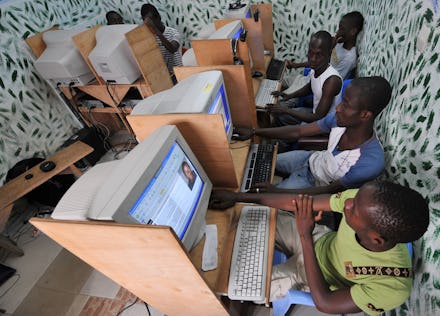A Startup Is Using the Space Race to Provide Internet for Countries Run by Dictators

Of the 7 billion people on Earth, more than half don't have access to reliable Internet coverage. An independent media startup called Outernet plans to change all that. And thanks to an announcement Friday by the U.K. Space Agency agreeing to fund the project, Outernet can make that a reality.
Using shoebox-sized satellites called CubeSats, Outernet plans to offer Internet access the same way we receive radio broadcasts. Signals of various frequencies from the CubeSats get compiled by digital receivers to become digital files. For instance, through the text-message service SMS, an Internet user in Kenya can say they want to learn about anything from health care to soccer scores, and then be sent any relevant information on the topic.
"We could send all of Wikipedia," Syed Karim, founder and CEO of Outernet, told Mic. "Essentially, anything that lives on your computer is what we can transmit over Outernet."
At its most basic level, Outernet is a means of connecting to the Internet — without access to a traditional Wi-Fi network — via a receiver, which can be anything from a homemade model via Outernet's receiver instruction guide, a mobile receiver of Outernet's design called Lantern or the high-speed Pillar in development, which, according to the company, could be used as a digital public library, installable anywhere in the world. "It's like broadband versus dial-up," Karim says.
The lantern receiver, standing at roughly the size of a water bottle, shows a lot of practicality as an emergency beacon during natural disasters or being stranded in the middle of nowhere. But its ability to not just help in emergencies, but thrive in the middle of nowhere, is how Outernet will stand out the most. Not only for its use in countries with minimal infrastructure, but in nations where the Internet is closely monitored and heavily curated.
"Everyone on the team believes in the notion of universal access to information," Karim says. "I've been told by people who interacted closely with North Korean defectors and they said there is Internet there and it's very limited. They have their own version of Wikipedia."
While defending against censorship wasn't specifically the purpose, Karim says he's cognizant of it: Outernet's network is built on multiple frequencies, which helps assure universal access and make its signals harder to jam.
And not being able to jam that signal means a lot of information can travel. According to Outernet's fully fundraised Indiegogo campaign, the 10 megabytes it sends daily can include an ebook, a (short) TED talk, five academic journal articles, six weather maps, 250 Wikipedia articles, 2,000 of the most-trending tweets and five news stories from every country in the world.
Four days ago, Karim installed Outernet's first company-made receiver on a building in Kenya. By 2016, Outernet plans to have three of its sub-$50,000 nanosatellites in orbit, each delivered by piggybacking on larger launches for other projects. "It costs about $100,000 per kilogram," Karim says. "The cost of the launch is much more expensive than the satellite itself."
With the U.K. Space Agency and Clyde Space as its partners in the project, Karim and Outernet's vision just took a step toward a globally accessible future.